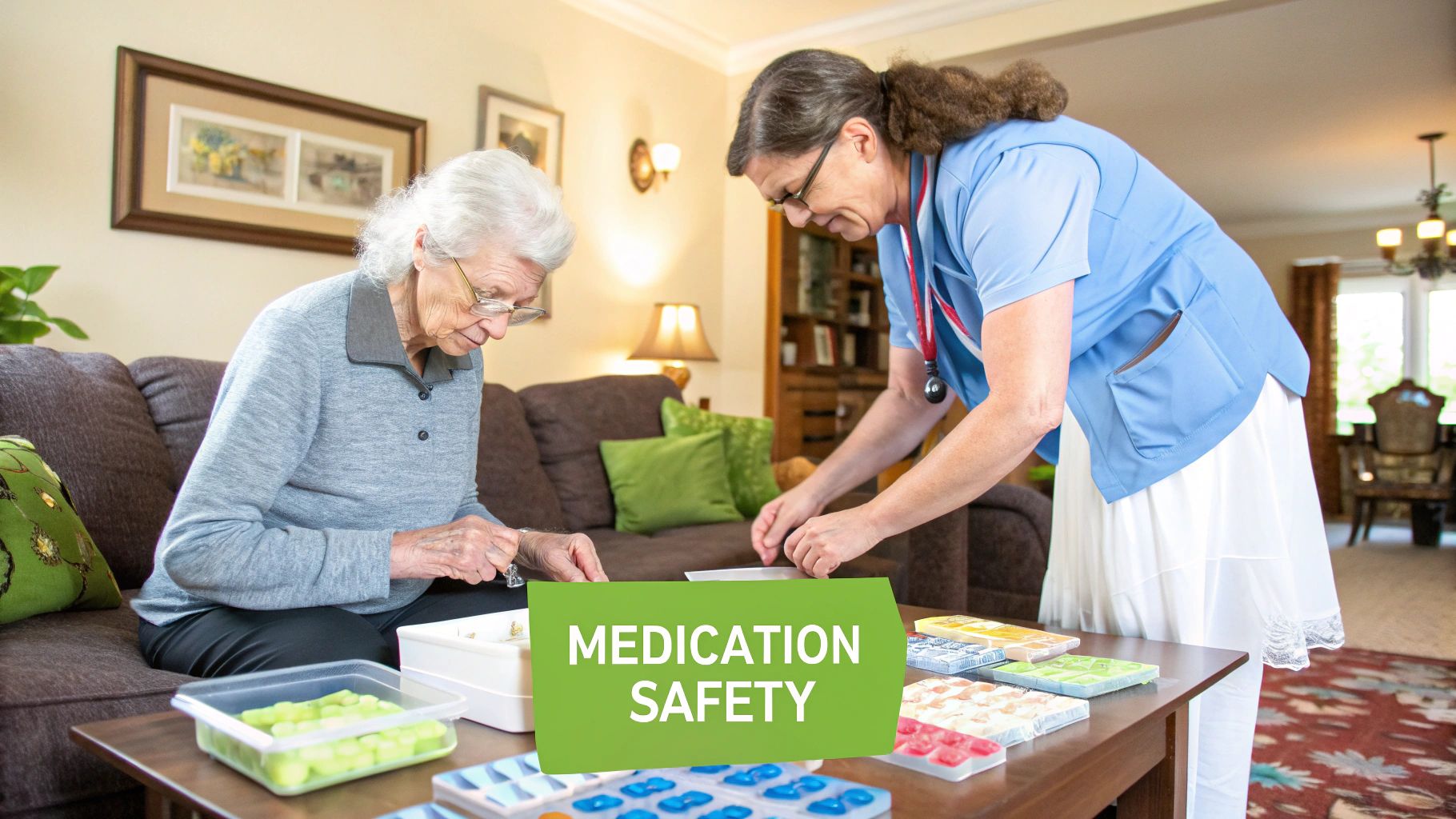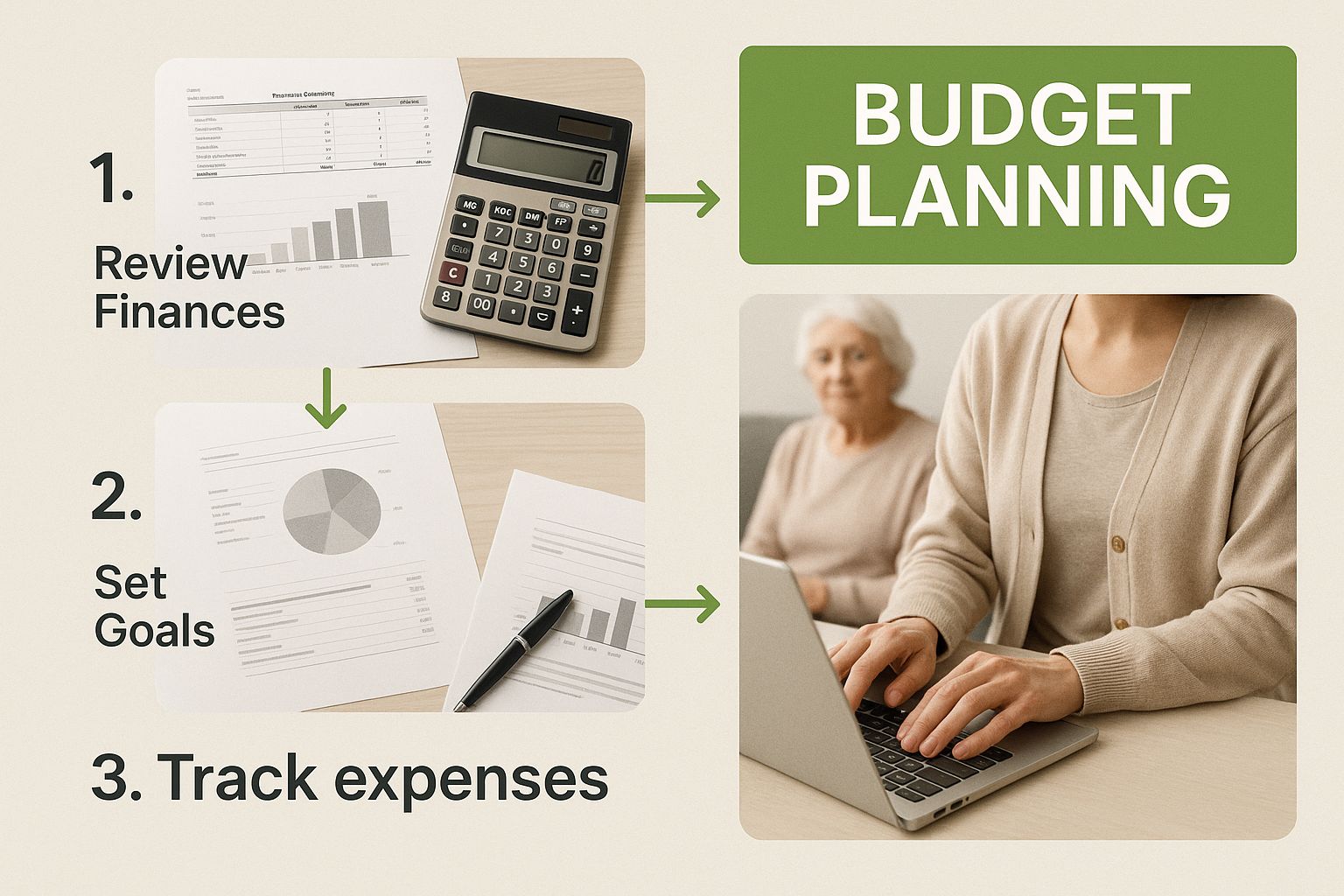Realising your parents need more support is a huge, often emotional, moment. It's that dawning understanding that your relationship is shifting—you're moving from being their child to becoming their carer. This is a massive transition, there's no doubt about it, but it's one you can absolutely navigate with a bit of planning, a lot of patience, and good old-fashioned empathy.
Starting Your Journey as a Carer

It’s easy to feel completely overwhelmed at first. The key is to turn that worry into action by getting a clear picture of what's really going on. Many of us are thrown into this role without any warning, finding ourselves part of a huge, unseen community of family carers.
You are definitely not alone. The 2021 Census revealed there are 5.8 million unpaid carers in the UK, many of whom are providing round-the-clock support for their loved ones. It just goes to show how much our elderly care system relies on people just like you.
Initiating Difficult Conversations
One of the first, and frankly toughest, hurdles is actually talking to your parents about needing help. These chats can feel incredibly awkward, particularly if your parents are proud and fiercely independent. The trick is to handle it with real sensitivity.
Rather than making demands, try asking gentle, open questions to get the ball rolling.
- "I've been thinking about the future, Mum. I'd love to know what your wishes are for the long term. Have you given it much thought?"
- "Dad, I've noticed the stairs seem to be a bit of a challenge lately. Do you think we could make a few small changes around the house to make things safer?"
- "Would you mind if I popped over to help with the weekly shop or sort through some of that paperwork?"
These kinds of questions show you're coming from a place of care, not control. It’s all about opening up a dialogue, not forcing a solution on them.
Remember, this has to be a partnership. Their thoughts and feelings are crucial. The best plans are always the ones where they feel listened to and involved in the decisions about their own lives.
Assessing Their Current Needs
Once you've started talking, the next logical step is to get an honest look at what support they actually need. This doesn't have to be a formal inspection; just a quiet, informal assessment can help you spot the specific challenges they're facing day-to-day.
You could even create a simple checklist for yourself. Think about areas like:
- Personal care: Are they managing with bathing and dressing?
- Household tasks: Is cooking and cleaning becoming difficult?
- Health management: Are they keeping up with medications and appointments?
- Mobility: How are they getting around the house or going out?
This initial assessment gives you a solid starting point. It helps you see the real scope of care needed so you can build a plan that actually works. As you start down this path, have a look at these essential tips for caring for elderly parents at home – they can be a huge help.
Building a Personalised Care Plan That Works
Right, you’ve got a handle on what your parents need. The next job is to turn all that knowledge into a real, practical plan. Trying to care for elderly parents without a clear framework can feel like you're constantly putting out fires. A good care plan gives you structure, but it’s not something you just write once and file away.
Think of it as a living, breathing guide. It needs to be flexible enough to change as your parents' needs evolve, because they almost certainly will.
The real goal here is to create something that helps them stay independent for as long as possible, while still keeping them safe and well. It's a tricky balance between managing their health, keeping daily life running smoothly, and making sure they feel connected and valued. A solid plan takes the pressure off everyone and makes sure care is consistent, especially if you’ve got other family members or professional carers involved.
The Core Components of an Effective Plan
A strong care plan looks at the whole person, not just their medical chart. It’s about their entire day-to-day life. The best way to start is by breaking it down into a few key areas so it doesn't feel so overwhelming.
Here’s what you absolutely must cover:
- Medical Management: Get all the medical details in one place. We’re talking a full list of doctors, their contact numbers, appointment schedules, and every single medication—including what it's for, the dosage, and when it needs to be taken.
- Daily Living Support: Be specific about what they need help with day-to-day. Is it getting meals ready? Help with bathing and dressing? Getting up and down the stairs? Note down exactly what kind of assistance is required and when.
- Nutrition and Diet: Map out what they should be eating, what they enjoy, and any special dietary rules from their doctor. This is really important. For instance, if heart health is a concern, you'll want to look into things like effective lifestyle changes for managing heart disease and build those into their meal plans.
- Social and Emotional Wellbeing: Don’t let this one slip. Loneliness is a huge risk for older adults. Plan for regular social contact—visits from you, phone calls with old friends, or maybe even joining a local club or group.
Collaboration is Key to Success
Here’s the most important bit: you can't—and shouldn't—do this alone. This entire process has to be a team effort, and your parents are the most valuable players.
Sit down and talk with them. What do they want? What do they still feel confident doing themselves, and where would they appreciate a bit of help? Giving them a voice and control over their own care is absolutely vital for their dignity.
And then there's the rest of the family. Get your siblings or other close relatives together for a proper chat. Decide who is doing what, and make sure everyone is on the same page from the start. It's the best way to stop one person from burning out and to avoid any arguments down the road.
A shared understanding from the outset prevents misunderstandings later. Agreeing on roles and expectations ensures your parents receive consistent, coordinated support from a united family front.
Getting to grips with how a well-structured plan can work in the real world is a game-changer. You can find out more about how personalised home care supports independent living to see these ideas in action.
The image below breaks down one of the most critical parts of the process: sorting out the finances to make the plan sustainable.

As you can see, getting the budget organised isn't just an afterthought—it's a foundational step that makes sure the plan is realistic and can be maintained for the long haul.
Putting it All on Paper
To make sure your plan is actually used, you need to write it down and make it easy for everyone to find. A shared Google Doc works wonders, but a simple notebook kept on the kitchen counter is just as good.
To get you started, here's a checklist of the essential components your care plan should cover. It's a good way to make sure you haven't missed anything important as you pull it all together.
Essential Components of a Care Plan Checklist
| Care Component | Key Considerations | Action Items |
|---|---|---|
| Medical Management | Prescriptions, doctor's appointments, health conditions, allergies. | Create a medication schedule. List all healthcare contacts. Note upcoming appointments in a shared calendar. |
| Personal Care & Hygiene | Assistance needed with bathing, dressing, grooming, toileting. | Detail the level of support required for each task. Schedule assistance for specific times of the day. |
| Nutrition & Meal Prep | Dietary restrictions, food preferences, hydration needs, ability to cook. | Plan a weekly menu. Create a shopping list. Arrange for meal preparation help if needed. |
| Mobility & Safety | Use of walking aids, fall risks, ability to navigate the home. | Conduct a home safety assessment. Install grab bars or ramps if necessary. |
| Household Management | Cleaning, laundry, shopping, managing bills and post. | Assign or schedule specific household chores. Set up direct debits for bills where possible. |
| Social & Emotional Support | Companionship, hobbies, social activities, contact with friends and family. | Schedule regular visits and calls. Research local community groups or activities. |
| Emergency Plan | Key contacts, location of important documents, advance directives (e.g., DNR). | Create an easy-to-find emergency contact list. Ensure everyone knows where key documents are kept. |
Using a checklist like this ensures a comprehensive approach, covering every facet of your parent's wellbeing.
Once you’ve gathered the information, make sure your final document clearly outlines a weekly timetable, emergency information, and the location of key documents.
This simple, organised approach can turn what feels like a monumental task into a set of clear, manageable actions. It brings peace of mind not just for you, but for everyone involved in looking after your parents.
Managing Daily Life and Emotional Wellbeing

Once you've got a solid care plan sorted, your focus can shift to the day-to-day rhythm of supporting your parents. This is where the practical side of caregiving really blends with the emotional, moving beyond simple schedules and getting to the heart of their wellbeing.
It’s all about finding that fine line between helping and hovering. The real goal is to provide support in a way that empowers them, helping them keep a firm grip on their independence for as long as possible while still making sure they're safe and looked after.
Fostering Independence in Daily Tasks
Helping with daily activities takes a lot of patience and a gentle touch. Whether it's making a meal, personal hygiene, or just getting from A to B in the house, the trick is to encourage them to do what they can for themselves.
Instead of just taking over, try breaking a task down into smaller, more manageable steps. For example, when you're making dinner, maybe they could wash the vegetables while you do the chopping. This kind of teamwork helps them feel capable and properly involved in their own life.
It's the same with personal care. Small aids can make a massive difference. A long-handled brush or a sturdy shower seat might be all it takes for them to continue bathing on their own, preserving both their dignity and their sense of self-sufficiency. It’s about adapting the environment to fit their abilities, not the other way around.
The most compassionate support often means stepping back, not stepping in. Encouraging independence builds confidence and maintains a parent's sense of control over their own life, which is absolutely crucial for their mental health.
Navigating the Emotional Landscape
The emotional side of care is every bit as important as the physical. Loneliness and low mood are huge risks for older adults. In fact, some studies suggest that around 20% of people aged 55 and over experience some form of mental health concern. Often, the signs are subtle and all too easy to miss.
Keep an eye out for any changes in their behaviour. Are they pulling back from conversations? Have they lost interest in hobbies they used to love? Are their sleeping or eating habits off? These can all be quiet signals that they’re struggling emotionally.
One of the most powerful things you can do is to help them maintain meaningful social connections.
- Schedule Regular Visits and Calls: Consistency is everything. A quick, daily phone call can mean the world, often more than a long visit every few weeks.
- Encourage Community Engagement: Help them find and connect with local clubs, faith groups, or activity centres that line up with their interests.
- Use Technology: Simple gadgets like tablets can open up a whole new world, making it easy to have video calls with family and friends who live further away.
Having difficult conversations is also part of this emotional journey. If you notice they're struggling or pushing back against help, always approach the topic with empathy. Try using "I" statements to show your concern, like, "I get worried when I see you struggling with the shopping," instead of a more confrontational, "You need to let me help you."
Prioritising Your Own Wellbeing
You simply can't pour from an empty cup. Caring for your parents is incredibly demanding, and if you don't look after yourself, you're heading straight for burnout. Taking regular breaks isn’t a luxury; it's an absolute necessity.
This is where services like respite care can be a true lifeline. Having a professional carer step in for a few hours or even a few days gives you a chance to rest, recharge, and tend to your own life without a shred of guilt. It ensures your parent receives continuous, quality care while you get that much-needed break. If you're new to the idea, understanding what respite care for the elderly is and why it's so important can be a real eye-opener.
By managing daily tasks with a focus on independence and paying close attention to both your parents' emotional health and your own, you'll create a caring environment that's supportive and sustainable for everyone involved.
Creating a Safe and Comfortable Home Environment
When it comes to caring for elderly parents at home, making their space safe is the absolute bedrock of everything else. So many accidents in later life, especially falls, are completely preventable with just a few thoughtful changes. The best approach is to tackle it room by room, spotting potential hazards before they can cause a problem. It brings huge peace of mind for everyone.
The goal isn't to wrap them in cotton wool, but to make their living space work for them. It’s about boosting their independence and comfort, not creating new obstacles. You’ll find that simple, low-cost solutions are often the most powerful. It’s all about creating an environment where they can move freely and confidently in the home they love.
A Practical Room-by-Room Safety Check
Try to walk through the house and see it through your parent’s eyes. What looks perfectly fine to you could be a real hazard for someone with reduced mobility, poorer eyesight, or less strength.
Here’s a practical checklist to get you started:
- Hallways and Stairs: Are they bright enough, especially at night? Pop in a few plug-in night lights. Make sure carpets are tacked down securely and get rid of any loose rugs – they are a classic trip hazard. Sturdy handrails on both sides of the stairs are a non-negotiable.
- Living Room: Clear away clutter like stacks of newspapers or trailing wires from the TV. Give the furniture a wobble – is it stable enough to be used for support? You want to ensure there's a clear, wide path through the room.
- Kitchen: Move the things they use every day – mugs, tea, cereal – onto lower, easy-to-reach shelves. This avoids risky stretching or climbing. Check that appliances are working properly with clear controls. A kettle that switches itself off is a brilliant and simple safety win.
- Bathroom: This is probably the highest-risk room in the house. You’ll want to install non-slip mats in the bath or shower. Sturdy grab rails next to the toilet and in the shower are also essential. A raised toilet seat can make a world of difference, too.
Proactive safety checks aren't about limiting independence; they're about enabling it. A few thoughtful modifications can prevent the very accidents that often lead to a loss of confidence and mobility.
Leveraging Assistive Technology for Added Security
Beyond the physical changes, modern tech can add a fantastic extra layer of security. These gadgets aren't just for show; they offer real, practical support and can be a genuine lifeline in an emergency.
Even simple devices can have a massive impact on daily safety and your own peace of mind.
- Personal Alarms: A simple pendant or wristband with an emergency button means your parent can call for help instantly if they have a fall or feel unwell.
- Smart Pill Dispensers: These clever boxes can be set up to release the right medication at the right time, with alarms and notifications to prevent any missed or incorrect doses.
- Video Doorbells: A great bit of kit that lets your parents see who is at the door on a screen without having to open it, giving them security against cold callers or unexpected visitors.
The Importance of a Comfortable Atmosphere
While safety is the priority, never underestimate the power of comfort for emotional wellbeing. A home needs to feel like a sanctuary, not a clinic. Make sure their favourite chair is still supportive and that the house is always at a pleasant temperature.
Good lighting, familiar decorations, and family photos all help to create a positive, reassuring atmosphere. This feeling of comfort and security is a vital part of caring for the whole person. While you can measure physical safety, the feeling of being content at home is priceless, which is why companionship is just as important as physical care. By creating a space that is both safe and emotionally comforting, you're supporting every aspect of their wellbeing.
Finding and Working with Professional Services
Sooner or later, most family carers realise they can't do it all themselves. And that’s not a sign of failure—it's actually a sign of strength. Deciding to bring in professional help shows you’re thinking strategically about your parent’s long-term wellbeing, and your own. It’s about ensuring they get the specialised support they need while protecting you from burnout.
At first, the world of professional care services in the UK can feel like a bit of a maze. You’ll hear terms like domiciliary care, respite, and live-in care, and figuring out what’s right for your family is the first hurdle. But don't worry, there's a solid framework of support out there once you know where to look.
Understanding the Different Types of Care
Before you start searching, it helps to know what’s on offer. Professional care isn't a one-size-fits-all solution; it’s designed to meet specific needs at different points in your parent's journey.
- Domiciliary Care: This is what most people think of as ‘home care’. A professional carer visits your parent’s home for set periods to help with daily life. This could be anything from personal care like washing and dressing to practical help like cooking, cleaning, or making sure they take their medication on time.
- Live-in Care: If your parent needs round-the-clock support but is determined to stay in their own home, a live-in carer is an excellent option. They reside in the house, offering constant assistance and, just as importantly, companionship.
- Respite Care: This is a short-term arrangement designed to give you a break. A professional can step in for a few hours, a full day, or even a couple of weeks so you can rest and recharge your batteries. It’s absolutely vital for avoiding burnout.
- Specialist Care: This is care delivered by professionals with specific training for conditions like dementia, Parkinson’s, or for helping someone recover after a stroke.
The UK's home care sector is huge, with nearly a million people receiving publicly-funded care alone. But it's also a sector under immense pressure. Recent data shows that almost half (48%) of home care providers have had to turn away requests for care, mostly due to recruitment issues. With job vacancies in domiciliary care at 13%—four times the national average—finding consistent, quality support requires a proactive approach. Policybee.co.uk has a great breakdown of the latest home care statistics if you want to dig deeper.
Finding and Vetting Reputable Agencies
Once you have an idea of the type of care you need, the search for a provider you can trust begins. Your parent’s safety and wellbeing are everything, so taking the time to vet agencies properly is non-negotiable.
A good place to start is your local area. The NHS website and your local authority's social services department are great resources. You should also check with the Care Quality Commission (CQC) in England, which inspects and rates all health and social care services. An agency with a "Good" or "Outstanding" CQC rating is a very positive sign.
When you've got a shortlist, it's time to ask some direct questions. Don't be afraid to dig into the details.
A reputable care agency will welcome your questions. They should be completely transparent about their staff training, how they handle emergencies, and the process they use to match carers with clients. A good match is about more than just skills; personality and rapport are key.
Here are a few essential questions to ask any potential provider:
- How do you recruit, train, and supervise your carers?
- Are all carers DBS (Disclosure and Barring Service) checked?
- What’s your process for creating and reviewing a personalised care plan?
- What happens if our regular carer is sick or on holiday? Is cover guaranteed?
- Can we meet the carer you’ve chosen for us before the service begins?
Navigating Funding and Financial Support
Let’s be honest: the cost of professional care is a major worry for most families. The good news is that you don't have to figure it all out on your own, and there are several avenues for financial support in the UK.
Your first port of call should always be your parent’s local authority. You can ask them for a needs assessment for your parent and a carer's assessment for yourself. These formal assessments will determine if they are eligible for any council-funded support. Even if their income or savings are too high to qualify, the assessment process itself provides invaluable advice and can point you towards trusted local services.
It's also worth looking into key benefits your parent may be entitled to:
- Attendance Allowance: This is a tax-free benefit for people over State Pension age who need help with personal care or supervision because of an illness or disability. Crucially, it is not means-tested.
- Personal Independence Payment (PIP): For those under State Pension age, PIP offers similar support to help with the extra costs that come with a long-term health condition.
Building this professional support network is a complete game-changer. It ensures your parents get the high-quality care they deserve and gives you the breathing room to continue in your role without sacrificing your own health. This is especially true of respite services, which are fundamental to preventing exhaustion. You can learn more about how respite care supports families and prevents burnout in our detailed guide.
Common Questions on Caring for Your Parents
Looking after your parents is a journey, and like any journey, it’s full of unexpected turns and tricky questions. As things change, you’ll find yourself facing decisions that can feel huge and overwhelming, from figuring out finances to making profound choices about where your parents will live.
This section is here to give you some clear, straightforward answers to the most common questions we hear from carers across the UK. Think of it as a helpful guide to give you the confidence to make the best decisions for your family.
What Financial Support Is Available for Carers in the UK?
Getting a handle on the financial side of things is a really important first step. It can feel like a maze, but there are several types of support designed to take some of the pressure off.
The main one for you, as a carer, is the Carer's Allowance. This is a weekly payment you can get if you spend at least 35 hours a week caring for someone. It’s worth checking the eligibility rules carefully, though, as your own earnings can affect whether you qualify.
Your parent might also be able to claim benefits to help with the costs of their care needs:
- Attendance Allowance: This is for anyone over the State Pension age who needs help with personal care or needs someone to keep an eye on them. The crucial thing to know is that it isn’t means-tested, so your parent's savings or income don't affect it.
- Personal Independence Payment (PIP): If your parent is under the State Pension age, PIP is there to help with the extra costs that come with a long-term health condition.
I’d also strongly recommend getting in touch with your local council to ask for a Carer’s Assessment. This isn’t just about money; it can open doors to other kinds of support, like getting a break through respite services or getting practical help around the house.
How Do We Decide if a Care Home Is the Right Option?
This is one of the toughest, most emotional conversations a family can have, and there’s absolutely no one-size-fits-all answer. The decision almost always comes down to a few key things that you need to weigh up together.
Start by thinking honestly about the level of care your parent needs now. If they need round-the-clock medical supervision or specialised care for a condition like advanced dementia, a care home is often the safest and most appropriate setting. You also have to consider how sustainable the current situation is. If you're feeling burnt out and your own health is starting to suffer, it might be time to look at other options.
It’s a situation many families find themselves in. As of August 2023, there were roughly 327,253 residents in older adult care homes in England alone, which shows just how many people rely on this kind of formal support. You can find more of the official care home statistics on GOV.UK.
The only way forward is through open and honest conversations with your parent (if they're able to participate), the rest of your family, and their doctors. It’s also vital to visit several care homes to get a real feel for the place—the atmosphere, the staff, and the quality of life they offer.
How Can I Balance Caring with My Job and Family?
Juggling everything is, without a doubt, one of the biggest challenges you’ll face. It takes a lot of organisation, clear communication, and, most importantly, being willing to ask for and accept help.
First off, have a chat with your employer. Many UK companies are more supportive than you might think and have policies for carers, like flexible working, compressed hours, or the right to take unpaid time off for emergencies. You won't know unless you ask.
Next, remember you can't do it all on your own. It's time to lean on your support network. Have a frank conversation with siblings or other relatives about how they can chip in, whether that’s with practical help or by contributing financially. Friends and neighbours can be a brilliant source of support, too.
Getting organised is also key. Use shared digital calendars to coordinate appointments and map out a weekly schedule so everyone knows who’s doing what and when. When you're managing their home, you'll also have to deal with the practicalities of house maintenance. For example, knowing the ropes of finding a reliable plumber can save you a world of stress when a pipe suddenly bursts.
And finally, look after yourself. That isn't being selfish; it’s essential. You can't pour from an empty cup, and you need to be well to give them the best possible care.
At Cream Home Care, we know just how complex caring for elderly parents can be. Our professional team provides personalised domiciliary, companionship, and respite care services across Stoke-on-Trent and Newcastle-under-Lyme to support you and your family. If you need a trusted partner on your care journey, explore our services at https://creamhomecare.co.uk.






